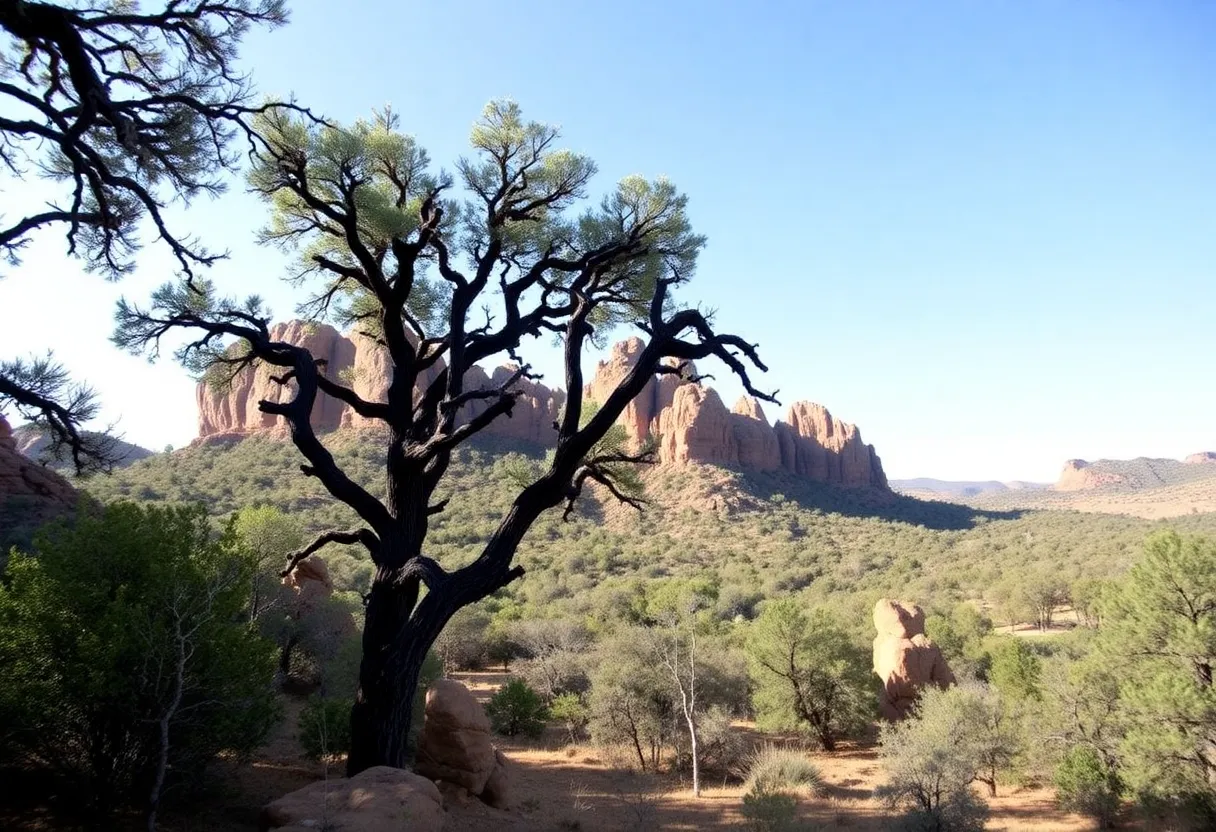News Summary
The U.S. Supreme Court has denied an appeal from Apache Stronghold, permitting a controversial copper mining project at Oak Flat, a site of great spiritual significance for the Apache community. This decision solidifies the previous court rulings that support the transfer of this sacred land to Resolution Copper. The mining project poses risks to the environment and community’s religious practices, sparking outrage among Apache tribes while promising economic benefits for Arizona.
Supreme Court Decision Sets Stage for Copper Mine at Sacred Apache Site
The U.S. Supreme Court has made a significant ruling by denying an appeal from Apache Stronghold that sought to block a controversial copper mining project at a site called Oak Flat, cherished by the Western Apache community. With this decision, the previous court rulings that allowed the transfer of this sacred land to Resolution Copper are now firmly in place.
Background on Oak Flat
Located in the scenic Tonto National Forest, Oak Flat has profound spiritual importance for the Apache people. Traditionally, this area has been used for various religious ceremonies, including crucial rites of passage for Apache youth. The community views the site as not just land but as a sacred space intertwined with their identities and beliefs.
The Transfer and Its Implications
The land transfer was supported by the Trump administration back in 2014 as part of an agreement that involved giving up other land parcels to Resolution Copper. This company has announced plans to mine what is often called the world’s second-largest known copper deposit, expected to yield approximately 40 billion pounds of copper. However, this ambitious project comes at a hefty cost, as it is projected to create a massive crater, 1,100 feet deep and 2 miles wide, potentially obliterating access to the sacred Oak Flat.
Reactions from the Apache Community
Members of Apache Stronghold, representing the San Carlos Apache Tribe, are understandably distressed by the Supreme Court’s decision, labeling it a “heavy blow” to their community. They argue that this mining project violates their religious rights, as outlined in the Religious Freedom Restoration Act. The tribe’s commitment to fighting this decision indicates their deep connection to the land. They have not shied away from calling for congressional intervention, emphasizing the need for acknowledgment and respect of their spiritual beliefs.
Dissenting Views from the Court
Among the justices, there were differing opinions. Justice Neil Gorsuch expressed his dissent, describing the court’s choice to not take the case as a “grievous mistake.” He brought attention to the long history of the Apache people’s connection to Oak Flat, highlighting that ongoing government actions threaten their fundamental religious practices. Interestingly, Justice Samuel Alito chose not to participate in the case, citing a potential conflict of interest due to his stock holdings in BHP, a partner in Resolution Copper.
The Economic Argument
On the opposite side of the aisle, Resolution Copper’s general manager, Victoria Peacey, pointed out that the copper mining project could lead to an economic boost for Arizona, potentially generating around $1 billion annually and providing thousands of job opportunities. While many are eager to explore the economic benefits, the discussions surrounding job creation clash with the spiritual concerns of the Apache people.
Environmental Considerations
Before this ruling, the Biden administration started a pause on the environmental review process associated with the land transfer to better consult with Native American tribes. This move shows an acknowledgment of the complex relationship between development and sacred sites. The 9th Circuit Court had previously ruled that the land transfer did not significantly burden the tribe’s religious practices, a conclusion that continues to spark debate.
A Community’s Resolve
Despite the challenges ahead, Apache Stronghold and representatives from the San Carlos Apache Tribe remain undeterred in their pursuit to protect Oak Flat. They plan to continue the legal battle, determined not only to preserve their sacred land but to remind the world of its spiritual significance. With the surface of this issue still very much alive, the fate of Oak Flat is bound to be a vital topic in the ongoing discussion about indigenous rights, religion, and environmental stewardship.
Deeper Dive: News & Info About This Topic
- AP News: Supreme Court Decision on Oak Flat
- Arizona Mirror: Apache Plea Denied
- Washington Post: Supreme Court on Oak Flat
- Fox 10 Phoenix: Supreme Court Rejects Apache Plea
- NBC News: Supreme Court Turns Away Native American Lawsuit
- Wikipedia: Oak Flat
- Google Search: Oak Flat Sacred Land
- Google Scholar: Oak Flat Apache
- Encyclopedia Britannica: Oak Flat
- Google News: Oak Flat Copper Mine

Author: STAFF HERE PETERSBURG WRITER
The ST PETERSBURG STAFF WRITER represents the experienced team at HEREStPetersburg.com, your go-to source for actionable local news and information in St Petersburg, Pinellas County, and beyond. Specializing in "news you can use," we cover essential topics like product reviews for personal and business needs, local business directories, politics, real estate trends, neighborhood insights, and state news affecting the area—with deep expertise drawn from years of dedicated reporting and strong community input, including local press releases and business updates. We deliver top reporting on high-value events such as Grand Prix of St. Petersburg, Localtopia, and SHINE Mural Festival. Our coverage extends to key organizations like the St. Petersburg Area Chamber of Commerce and St. Pete Downtown Partnership, plus leading businesses in finance, manufacturing, and healthcare that power the local economy such as Raymond James Financial, Jabil, and Bayfront Health St. Petersburg. As part of the broader HERE network, including HEREJacksonville.com, HEREOrlando.com, HERETallahassee.com, and HERETampa.com, we provide comprehensive, credible insights into Florida's dynamic landscape.





